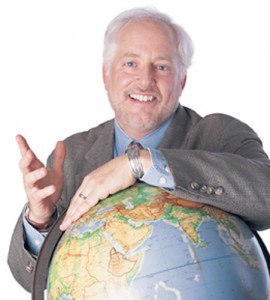Lamy tries to redefine educational experience
At the height of the Vietnam War, universities were the place to be for students wanting to make a difference in the world. On any given day, students could engage in discussion about the war, often with prominent figures such as Daniel Ellsburg.
“Universities were alive with this very complex, difficult debate about America’s role in the war,” said Vice Dean for Academic Programs Steven Lamy. “If you looked out the window at any university, there was a discussion about the war and people were mobilized.”
After spending about a year abroad, in Belgium and the Netherlands, and hearing about the war from a college campus, Lamy began rethinking his plans to use his studies in history and political science to become a lawyer. He was more interested in researching, and decided to attend the Graduate School of International Studies at University of Denver for his Ph.D.
Now, at USC, Lamy has translated his experience into teaching.
“The key thing is active learning,” he said. “The idea of active learning is not passively sitting there listening to a lecture, but interaction: talking in class, using case studies and doing exercises.”
One of his strategies to get students involved is a research exercise, Beyond Google: Basic Tools for Research in International Relations. He said that rather than having teaching assistants spend discussion sections restating lectures, he gives the students work to discuss, such as an exercise that asks students to search for various publications that provide information on a variety of topics, from South African foreign policy to who won the Biafra Civil War.
“[This] generation believes you can find everything on Google,” Lamy said. “My idea is, rather than say, ‘This is a journal,’ say, ‘Go find it.’ The idea is that you give them something like this to do and they develop skills to use later.”
Lamy also suggests students learn through teaching, so he created the Teaching International Relations Program, placing about 200 USC students in local high schools to teach a series of lessons on international relations. He said students also stand to learn more about the subject through the creation and teaching of their lessons.
“You do learn a lot about not only yourself, but about the field that you’re teaching when you attempt to teach,” Lamy said.
Lamy taught at the University of Transkei in South Africa during the apartheid, where he realized the value of education when a student stayed after class one night to apologize for falling asleep during class. The student told Lamy that he woke up at six every morning, spent the day teaching at a school in his village, then took four buses to the university for night classes. The student said he wanted to have a degree to teach when the apartheid was reformed. Lamy said the student attended class every night, and that was the only night he had ever fallen asleep.
“[This interaction] said to me that I’d better prepare very well,” Lamy said. “I can’t take this lightly. It set up the notion that we both have responsibility: The student has responsibility and I have responsibility. You come to learn, and I come to learn with you.”
Lamy’s work also took him to Eastern European countries, such as Russia and Estonia, at the end of the Cold War, as part of a program to develop case studies and to show university professors abroad how to teach international relations. Now, he stresses to his students the importance of traveling to learn more. He runs Problems without Passports, a program that provides short-term summer courses on global issues by taking students around the world. Past studies have taken students to Belize, Palau and Guam.
This summer, a group of students is traveling to the Arctic to research climate change. They will begin in Finland and end in Lapland, stopping in several other countries along the way to learn about global perspectives on the issue.
“It’s the idea of seeing the world from a different perspective,” Lamy said. “They have a different way of seeing things and that’s what study abroad does. The programs we’ve designed are short-term, but they’re appetizers. We hope that someone will go abroad and say, ‘It doesn’t hurt to go abroad, you can really learn something.’”

